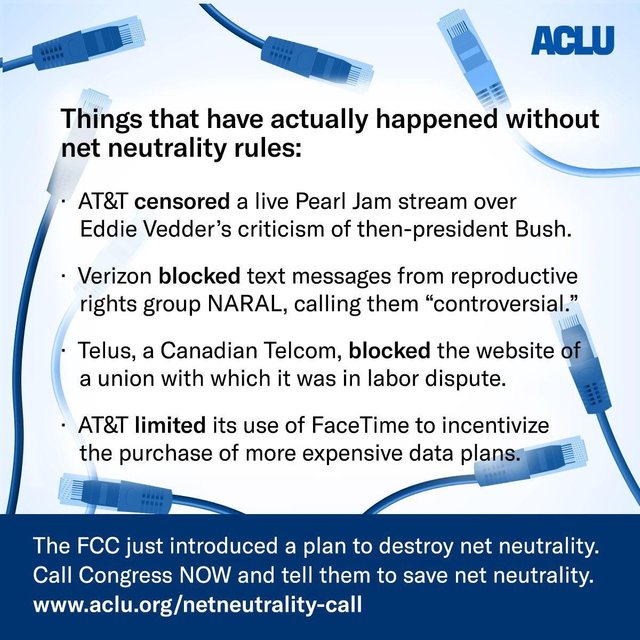Net Neutrality: Misinformation Galore

The above graphic is missing citations
Anyone can slap some text on top of some network cable images. We need to be vigilant to not just assume these stories are true or assume that they apply in the same context.
Let's take a look at a few of these "cases".
AT&T limited/blocked FaceTime: https://www.prepaidphonenews.com/2017/03/at-blocking-facetime-over-cellular-on.html
Seems like this happened in March... of 2017. That was during current FCC Net Neutrality rules** and it still happened.** The issue has since been resolved, AT&T claims it was a technical glitch. Maybe it was.
AT&T censored a live pearl jam stream: http://www.nbcnews.com/id/20201788/ns/technology_and_science-internet/t/att-censors-pearl-jam-then-says-oops/#.WhbpekdOnmE
This happened in August of 2007. AT&T acknowledged afterwards that the censor should not have happened. That said, this isn't an ISP service issue, and thus not a "net neutrality" specific concern. This is not much different than YouTube taking down a particular live stream because the content violates its TOS (this happens probably every day).
Verizon blocked text messages: http://www.nytimes.com/2007/09/27/us/27verizon.html
The text in the graphic says that Verizon blocked text messages, which is superficially accurate, but not the whole story: "Verizon rejected a request from Naral Pro-Choice America, the abortion rights group, to make Verizon’s mobile network available for a text-message program."
The nuance there changes the situation more than a bit.
That said, this case isn't relevant to "net neutrality" because it involves text messages, not internet service.
Telus is a Canadian ISP. The FCC has no jurisdiction over what Telus does or does not do. If Telus customers don't feel they are getting the quality of service they expect, they should switch to another provider. If they can't switch to another provider because their local governments have artificially raised barriers to entry thus causing limited or no competition, then that's the problem that should be solved first.
True neutrality can never be imposed top-down, especially politically.
The problems of centralization are never solved with more centralization.
The only way we can hope to solve this problem is to permit as many options, as many choices, as possible. To that end, the battle for the net starts locally, not nationally.
Eliminate the special privileges that your state and local governments grant to certain firms providing internet service. Competition is like gravity: a constant, leveling force that keeps everyone grounded, where success/flight requires constant effort.
The idiot convention that is the Federal Government will do nothing good for industry. I actually suspect it will throttle the first amendmemt, it is a power grab.
good information
Beep! Beep! This humvee will be patrolling by and assisting new veterans, retirees, and military members here on Steem. @shadow3scalpel will help by upvoting posts from a list of members maintained by @chairborne and responding to any questions replied to this comment.
I completely agree that we need to be vigilant against misleading or false information, and I definitely appreciate your looking into these claims and laying what actually happened. Thank you for sharing this!
I also agree that only competition can guarantee optimal outcomes for consumers. Government attempts at forcing specific outcomes usually either fail or come with unintended consequences.
However, I feel that it is important to recognize that some industries have natural barriers to entry that result in "natural" monopolies. The telecommunication industry is one such example. The amount of infrastructure required to provide service to your first customer is immense, even without government red tape and fees. It is almost impossible for new players to enter the market. As a result, if this market is not regulated, it will inevitably consolidate over time as this or that firm gains a competitive edge and buys out another, until it is one giant monopoly -- the antithesis of competition.
Despite my Libertarian leanings, this is one industry that I believe requires intervention in order to maintain a competitive environment.
From my perspective, internet infrastructure is now the equivalent of what the post office used to be. Americans no longer communicate by mail; we communicate by e-mail. I therefore consider it within the constitutional responsibilities of the federal government to provide internet access to all citizens -- through the Post Office.
Just as the federal government has taken responsibility for building roads, sewers, power lines, and gas lines, because of how physically difficult and inefficient it would be for competing firms to build competing infrastructure, so the government ought to take over building internet infrastructure and renting it out to the highest bidding firms.